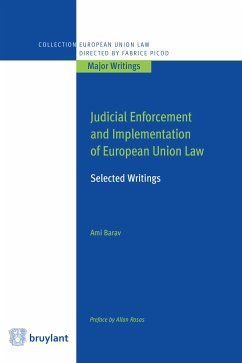
Preliminary References to the Court of Justice of the European Union and Effective Judicial Protection (eBook, ePUB)

PAYBACK Punkte
0 °P sammeln!
The preliminary reference procedure under Article 267 TFEU is the keystone of the EU judicial system and its legal order. Based on a dialogue between the Court of Justice and national courts, it is strictly linked to the protection of the rights that individuals derive from EU law.This book focuses on this procedure from the perspective of the right to effective judicial protection, in light of Article 19(1), second subparagraph, TEU and Article 47 of the Charter of Fundamental Rights of the EU. It explores the level of protection that is ensured to individuals in order to access to the Court ...
The preliminary reference procedure under Article 267 TFEU is the keystone of the EU judicial system and its legal order. Based on a dialogue between the Court of Justice and national courts, it is strictly linked to the protection of the rights that individuals derive from EU law.
This book focuses on this procedure from the perspective of the right to effective judicial protection, in light of Article 19(1), second subparagraph, TEU and Article 47 of the Charter of Fundamental Rights of the EU. It explores the level of protection that is ensured to individuals in order to access to the Court of Justice through preliminary references on the validity of EU acts and on the interpretation of EU law.
The book offers a threefold perspective on preliminary references, through an analysis of the case law of the Court of Justice itself, of the European Court of Human Rights in relation to Article 6(1) ECHR, and of the constitutional courts of Austria, Croatia, Czech Republic, Germany, Slovakia, Slovenia, and Spain, where the national courts' refusals to refer can lead to the violation of national constitutional rights. It further investigates the obligations for Member States and national courts in the framework of the preliminary reference procedure and how the right to effective judicial protection affects them. The examination outlines the implications that could flow from the recognition of a right for individuals to have a question referred to the ECJ, as part of the right to effective judicial protection under EU law, in particular its nature and its enforcement. Building upon the existing system of sanctions for the violations of the obligation to submit a preliminary question, the book advances some proposals to rethink the current system of remedies.
This book focuses on this procedure from the perspective of the right to effective judicial protection, in light of Article 19(1), second subparagraph, TEU and Article 47 of the Charter of Fundamental Rights of the EU. It explores the level of protection that is ensured to individuals in order to access to the Court of Justice through preliminary references on the validity of EU acts and on the interpretation of EU law.
The book offers a threefold perspective on preliminary references, through an analysis of the case law of the Court of Justice itself, of the European Court of Human Rights in relation to Article 6(1) ECHR, and of the constitutional courts of Austria, Croatia, Czech Republic, Germany, Slovakia, Slovenia, and Spain, where the national courts' refusals to refer can lead to the violation of national constitutional rights. It further investigates the obligations for Member States and national courts in the framework of the preliminary reference procedure and how the right to effective judicial protection affects them. The examination outlines the implications that could flow from the recognition of a right for individuals to have a question referred to the ECJ, as part of the right to effective judicial protection under EU law, in particular its nature and its enforcement. Building upon the existing system of sanctions for the violations of the obligation to submit a preliminary question, the book advances some proposals to rethink the current system of remedies.
Dieser Download kann aus rechtlichen Gründen nur mit Rechnungsadresse in A, B, CY, D, EW, E, FIN, F, GR, IRL, I, L, M, NL, P, SLO, SK ausgeliefert werden.













